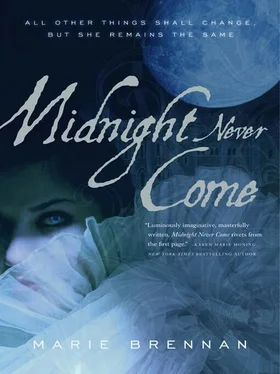“You might,” Vidar said, breaking her reverie, “have a chance to serve her Majesty again.”
She failed to hide entirely the sharp edge that put on her interest. “Say on.”
“Return to the mortal court.”
The blunt suggestion made her breath catch. To live among mortals again… it was exhausting, dangerous, and exhilarating. Few fae had the knack for it, or even a liking. No wonder Vidar had sent for her.
But what purpose did he have in mind? Surely not her former assignment, Lettice Knollys. If the fragments of gossip Lune had heard were correct, she was no longer at court; she was in mourning for the death of her second husband, the Earl of Leicester.
She took another sip of wine. This one burned more than the first. “Return, my lord? To what end?”
“Why, to gather information, as you did before.” Vidar paused. “And, perhaps, to gain access to — even leverage over — a certain individual.”
She had concerned herself too much of late with fae politics: the bargain with the folk of the sea, the raids of alfar ships, the never-ending tensions with the Courts of the North. Lune cursed herself for not keeping a closer eye on the doings of mortals: she did not know who was prominent now, whom she might be dispatched to trouble. She might not even recognize the name Vidar gave. “And who might that be, my lord?”
“Sir Francis Walsingham.”
Cut crystal dug into her fingers.
Lune said carefully, “I believe I recognize that name.”
“You should. He has lasted quite a long time, for a mortal, and risen high. Principal Secretary to Queen Elizabeth, he is now.” Vidar gestured, and a goblin brought him his wine cup again. “Have you ever met him?”
“He did not come to court until after I had ceased my masquerade.” Though she knew who he was, enough to be afraid.
“You will find him easily enough. The mortal court is at Richmond now, but they will shift to Hampton Court before long. You can join them there.”
Lune handed off her goblet to a servant. The wine tasted too much of regret, and impending loss. “My lord, I have not yet said I would undertake this task.”
A thin, predatory smile spread across Vidar’s face. In a purring voice, he said, “I do not think you have a choice, Lady Lune.”
As she had feared. But which was the greater risk: refusal or acceptance? Whatever honey Vidar used to coat it, she was not being offered this assignment out of a desire to see her redeem her past mistakes. Walsingham was not merely Principal Secretary; he was one of the foremost spymasters of Elizabeth’s court. And his Protestantism was of a puritan sort, that assumed all fae to be devils in disguise. Any attempt to approach him, much less keep watch over him, might result in him catching her out, and if he caught her out…
Only mortal food given in tithe to the fae protected glamours and other magics. A short period of imprisonment could have disastrous results.
Food. Lune said, “Such masquerades are costly, Lord Ifarren. To maintain a plausible presence at court, one must be there every day. Mortal bread—”
“You will have it,” Vidar said dismissively. “A spriteling will bring it to you each morning — or evening, if you prefer.”
He had capitulated far too easily. “No. Such a plan leaves no margin of safety. Were I to be bidden to some duty elsewhere and missed the messenger, we would risk exposure. A whole loaf at a time, or more than one.” A whole loaf, eaten only when needed, could cover quite a long journey in mortal disguise. Long enough, perhaps, to reach safety in another land.
If worse should truly come to worst.
Vidar’s cynical eye seemed to see her thoughts. “You overestimate her Majesty’s trust in you. But a week could be arranged. On Fridays, perhaps. Mortals assume we favor that day; we might as well oblige their fancies. And then you need not fear their holy day. I take it by this hard bargaining that you have agreed?”
Had she? Lune met Vidar’s gaze, searching the flat blackness of his eyes for some hint of — something. Anything. Any crumb of information that might guide her.
She could not even be certain these orders came from Invidiana. Vidar might have concocted them, as a means of removing her permanently.
No. Even he would not endanger the Onyx Court in such fashion, to risk her true nature being revealed.
…Or would he? His desires were no secret in the higher circles of court. Even Invidiana knew her councillor coveted her throne. Where the Wild Hunt would destroy the Queen and tear the Onyx Hall down stone by stone, scattering her court to the four winds, Ifarren Vidar was more subtle; he would leave all as it was, but claim the Crown for himself. If he could but find a way.
Was this it? Was Lune to become a pawn in some hidden scheme of his?
If so — if she could discover the pattern of it, and inform Invidiana—
There was more than one route to favor.
Lune spread her skirts, and gave him no more humble a curtsy than she had before. Humility would be more suspicious to him than pride. “I am most grateful for the chance to be of service to her Majesty.”
“Of course.” Vidar eyed her with satisfaction. “Would it please you to be seated, Lady Lune? I have prepared a description of the role you are to take—”
“Lord Ifarren.” She took pleasure in interrupting him. “My task is to be as you said? To gather information, and gain access to Sir Francis Walsingham?”
“And leverage, of whatever sort may offer itself.”
Nothing would offer itself, but she might create something. But that was neither here nor there. “Then I will create my own role, as her Majesty trusted me to do in the past.”
Displeasure marred the line of his mouth. “Her Majesty likewise trusted you to bargain sharply against the sea people.”
Lune damned the day she had ever been sent beneath the waves. Vidar had not been there, with the task of convincing the inhabitants of an alien land that the doings of mortal nations were their concern. Fae they might be, but unlike their landbound brethren, the mermaids and roanes and other denizens of the sea had not adopted current customs of courtly rule. And their idea of interaction with humans involved shipwrecks and the occasional lover, not politics. She had been lucky to find anything they wanted.
But to say so would sound peevish and weak. Instead she said, “You disdain mortal life, Lord Ifarren. Would you ride a horse raised by one who detested animals?”
“I know Walsingham,” Vidar said.
“And I will most humbly hear your advice where he is concerned. But you asked for me because there is none in the Onyx Court more talented at this art than I. When I approach the mortal court, I will do so on my own terms.”
The challenge hung in the air between them. Then Vidar waved one hand, as if it did not matter. “So be it. I will inform you of the court’s movements. And you will inform me of your chosen role, before you go to join them.”
“I will need some bread before then.”
“Why?”
Now he was the one sounding peevish. Lune said calmly, “To familiarize myself with the situation, my lord. I have not been among that court in many years.”
“Oh, very well. Now get out of my sight; I have other things to attend to.”
Lune made her curtsy and withdrew. If Vidar had meant to position her where she would fail, she had at least escaped one trap. And with the allotment she would be given, she could afford to trade her own bread to other fae for information.
Once upon a time, she had clawed her way up from insignificance to favored status, by shrewd trading and well-timed service. If she had done it once, she could — and would — do so again.
Читать дальше












